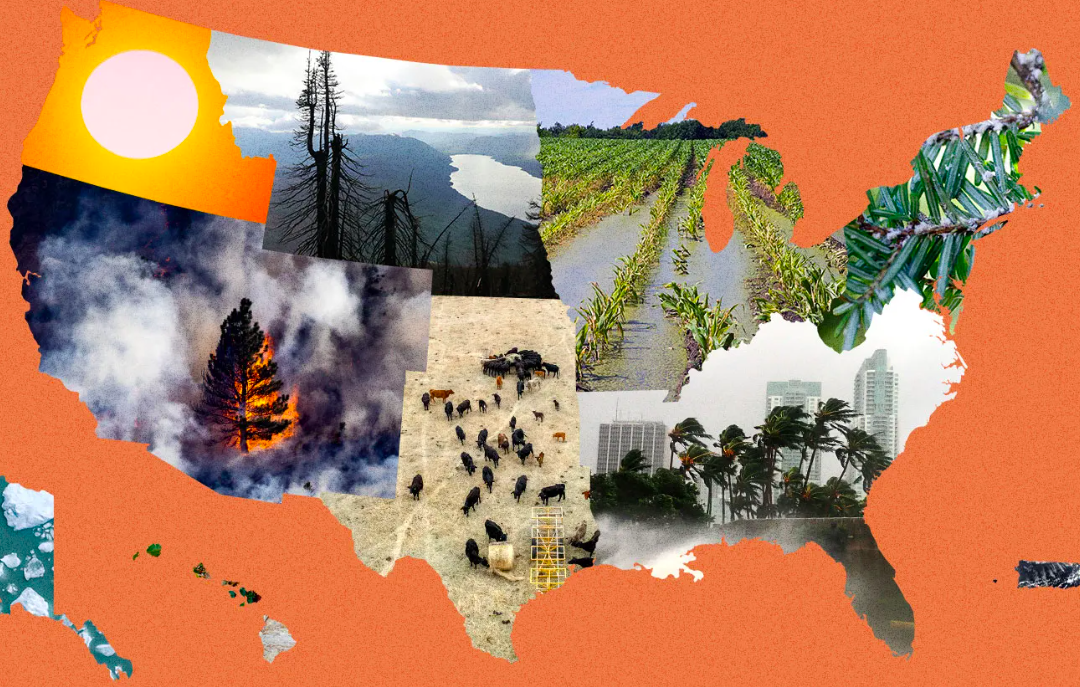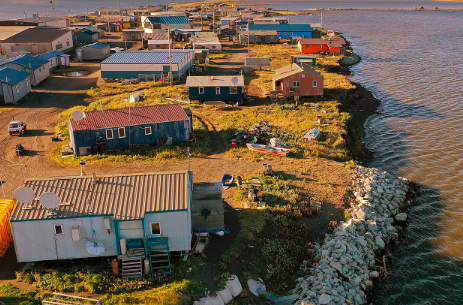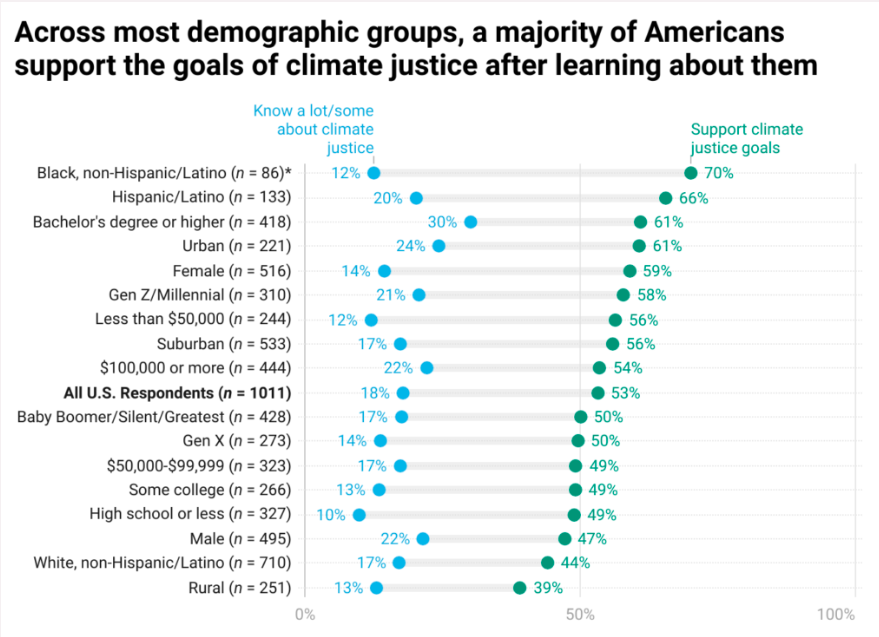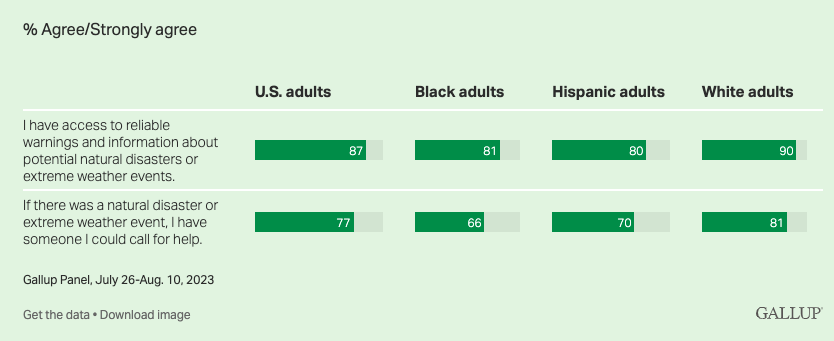Resources
Search below for resources covering the intersection of climate engagement, social science and data analytics.
RESULTS
The Fifth National Climate Assessment, released on Tuesday by the Biden administration, is unique for its focus on the present. Like previous versions, it looks at how rising temperatures will change the United States in decades to come, but it also makes clear that the rising seas, major hurricanes, and other disastrous consequences of climate change predicted in prior reports have begun to arrive. The effects are felt in every region. The report outlines steps every level of government can take to combat the climate crisis. And it takes stock of progress that has been made over the past four years. Despite this progress, climate impacts — oppressive heat domes in the Southeast that linger for weeks on end, record-breaking drought in the Southwest, bigger and more damaging hurricanes in the Atlantic basin, wildfires of unusual duration and intensity along the West Coast — are accelerating. The Grist staff, located all over the country, reviewed the assessment to provide you with the most important takeaways for your region.
New US climate report says land theft and colonization amplify the climate crisis for Indigenous peoples
Indigenous self-determination is a key climate solution — if the federal government can get behind it. The latest National Climate Assessment cites a 2021 study that concluded that Indigenous peoples in the United States lost 99 percent of their territories through colonization, and that the lands that they were forced to move to face higher wildfire risk and worse drought than their traditional homelands. According to the authors, Indigenous peoples across the continental U.S. and its island holdings hail from more than 700 tribes and communities, and while each community has a different relationship with the federal government, all share similar experiences of colonization through stolen land, cultural assimilation, and persistent marginalization. The report also detailed problems with the National Flood Insurance Program, a federal insurance program managed by the Federal Emergency Management Agency that helps homeowners insure against the risk of flooding, something that many insurance companies won’t cover. The program is supposed to help communities mitigate flood risk, but the report found that its implementation in Native communities has been flawed and ineffective.
Environmental Polling Roundup - November 10th, 2023
This post includes climate and environment headlines, data points, and key takeaways from recent public polls - including a new analysis of Americans’ climate justice attitudes and newly released polling on national parks and wildlife.
Who supports climate justice in the U.S.?
Demographics who are most inclined to support climate justice are hearing little about the concept. While climate justice is an important issue, many Americans are not yet familiar with it. According to our recent report, only about one in three Americans (34%) say they have heard or read at least “a little” about climate justice, while most (65%) say they have not heard of it. However, after reading a brief description of climate justice, about half of Americans (53%) say they support it, while large majorities of registered voters support climate justice-related policies. The groups who are least likely to know about climate justice include adults in the United States who have a high school education or less (only 10% know “some” or “a lot”), have some college education (13%), earn less than $50,000 per year (12%), are Black (12%), or live in rural areas (13%). Black adults, however, were the group with the highest level of support for climate justice (70%) after reading a description of it. Other demographic groups with high levels of support for climate justice after reading about it included adults in the U.S. who: are Hispanic/Latino(66%), have a Bachelor’s degree or higher (61%), or live in urban areas (61%). Overall, the groups with the largest gaps between having heard about climate justice (prior to reading a description) and supporting climate justice (after reading a description) were Black adults (12% said they know “a lot” or “some” about climate justice while 70% said they support its goals – a difference of 58 percentage points), followed by Hispanic/Latino adults, women, and those earning less than $50,000 per year (each with a difference of 45 percentage points).
Environmental Polling Roundup - November 3rd, 2023
This post includes climate and environment headlines, data points, and key takeaways from recent public polls - including new polling about fossil fuel accountability, publicly owned utilities, and frontline communities’ vulnerability to extreme weather.
Funding a Clean and Equitable Energy Transition: Lessons from California
California has been investing in a clean energy transition for decades, and, in recent years, has increasingly targeted funds to under-resourced and marginalized communities. Other states and the federal government have likewise stepped up. There is much to learn from California’s considerable experience. Our report series analyzes California’s decision-making structures — the processes that determine priorities and the mechanisms that turn broad justice principles into action. Our analysis and recommendations are intended to improve California’s programs, help emerging state programs consider the strengths and weaknesses of California’s institutional landscape, and influence emerging federal funding mechanisms.
Biden’s Fossil Fuel Fail: How U.S. Oil & Gas Supply Rises under the Inflation Reduction Act
The United States’ Inflation Reduction Act (IRA) fails to reduce fossil fuel production or alleviate impact on environmental justice communities. Rather than set the United States on a path toward a managed phase-out of fossil fuels, the Inflation Reduction Act and the Biden administration’s policies are set to lead to a significant increase in U.S. oil and gas extraction and soaring exports. This finding makes a mockery of President Joe Biden’s claims of “climate leadership” and signals that without additional action to constrain oil and gas production, the suffering of oil and gas frontline communities will only grow. Black, Brown, Indigenous, and poor communities, especially in Appalachia, the Gulf Coast, and the Permian Basin, are disproportionately impacted by fossil fuel pollution, climate disasters, and health impacts.
Poll: Black, Hispanic Americans More Vulnerable to Extreme Weather
Black and Hispanic Americans feel particularly vulnerable to extreme weather, reporting less confidence in their local governments and less preparedness in their communities. Wide majorities of all racial and ethnic groups “agree” or “strongly agree” that they have access to reliable warnings and information about potential natural disasters and that they have someone they can call for help in the event of extreme weather. Still, White Americans exceed both Black and Hispanic Americans by about 10 percentage points on each measure. Between 53% and 56% of Black and Hispanic adults agree they could recover and rebuild, have the resources to do so or have taken steps to prepare their household for a natural disaster or extreme weather event. Meanwhile, between 65% and 72% of White Americans agree across these measures -- indicating their greater degree of preparedness and ability to recover.
Environmental Polling Roundup - October 27th, 2023
This post includes climate and environment headlines, data points, and key takeaways from recent public polls - including a new Pew report on Americans’ climate attitudes, a new analysis of pro-climate Republicans, and new polling on President Biden’s investments in clean energy and infrastructure.
Environmental Polling Roundup - October 20th, 2023
This post includes climate and environment headlines, data points, and key takeaways from recent public polls - including new polling on the benefits of climate policies for people's health and Latino/a/x Americans' climate opinions.
Pagination
- Previous page
- Page 2
- Next page





